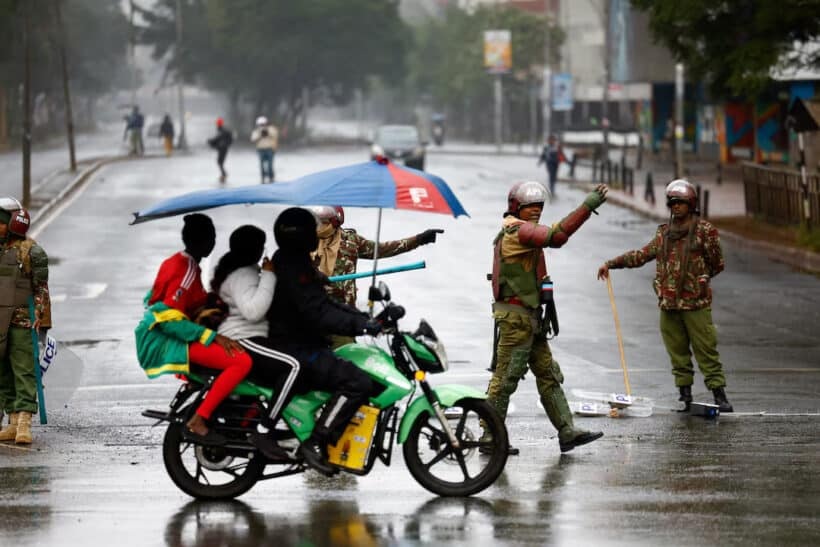Kenya is observing the anniversary of Saba Saba, a historic pro-democracy movement, under a heavy cloud of tension, as police barricades lock down parts of the capital and the public bristles with anger over economic hardship, corruption, and police violence.
Each year on July 7, Kenyans commemorate the Saba Saba protests of 1990, when thousands rallied to demand multiparty democracy during the authoritarian regime of President Daniel arap Moi.
The date, “seven seven” in Kiswahili, symbolizes a pivotal turning point in Kenya’s political history.
But in 2025, the mood is far from celebratory.
Monday’s anniversary comes just weeks after anti-government protests swept the country, sparked by economic discontent and compounded by widespread allegations of police brutality.
Those demonstrations turned chaotic and deadly, leaving dozens dead, hundreds injured, and thousands of businesses damaged or destroyed.
Nairobi, normally bustling, fell into an uneasy stillness.
Police set up checkpoints and roadblocks along major arteries, effectively sealing off the city center.
Many businesses opted to stay closed, fearing a repeat of the violence that erupted in June.
In a post on Sunday, Interior Minister Kipchumba Murkomen defended the security clampdown.
“Our security agencies are on high alert to deal decisively with criminals and other elements of ill intent who may seek to infiltrate peaceful processions,” he wrote on X (formerly Twitter), insisting the government was acting to “protect life and property.”
Yet critics accuse the state of escalating the tension and deliberately sabotaging peaceful activism.
Leading activist Hanifa Aden took to social media with biting sarcasm, posting: “The police getting rained on as they block every road while we stay at home warming our beds.”
She added, “Total shutdown and forced holiday executed by the state.”
Sunday saw further turmoil when a press conference by the Kenyan Human Rights Commission, organized to demand an end to extrajudicial killings and disappearances, was violently disrupted.
Armed men stormed the compound, forcing the gathering to disperse, a chilling reminder of the shrinking space for civil society.
Much of the anger fueling recent protests stems from Kenya’s economic stagnation and growing inequality.
Although the government has pursued reforms and infrastructure investments, about 80 percent of Kenyans continue to work in informal, poorly paid jobs with limited prospects.
Social media has amplified frustrations, especially among the youth, who feel left behind in a system they view as rigged against them.
The death of Albert Ojwang, a schoolteacher and blogger, in police custody last month ignited further outrage.
His case became a national flashpoint, symbolizing what protesters say is the entrenched culture of police impunity.
In a rare move, prosecutors brought murder charges against six suspects, including three police officers.
All six have pleaded not guilty.
The Kenya National Commission on Human Rights, a government-backed watchdog, reported 19 deaths during last month’s protests alone.
Since June 2024, at least 80 people have reportedly died in demonstrations, and dozens more have been detained without legal process.
Despite the unrest, President William Ruto, who took office in 2022, remains politically secure.
His alliance with opposition leader Raila Odinga has effectively neutralized formal political opposition, leaving protesters without a clear champion or electoral pathway.
With national elections not due until 2027, critics worry that public discontent may continue to simmer or explode again.
Meanwhile, Ruto’s administration has dismissed claims that it’s attempting to stifle dissent, instead framing the protests as being manipulated by criminal elements.
Some government officials even went so far as to compare the demonstrations to an “attempted coup,” a statement that has only further inflamed tensions.
As the anniversary of Saba Saba unfolds, Kenya finds itself in a familiar place, caught between the memory of a hard-fought democratic breakthrough and the stark reality of continuing struggle.
Protesters say they are honoring that legacy not with parades, but with a demand for change.
Whether or not that change comes, the silence that blanketed Nairobi on Monday spoke volumes.
It was the quiet of a population bracing for what comes next.







